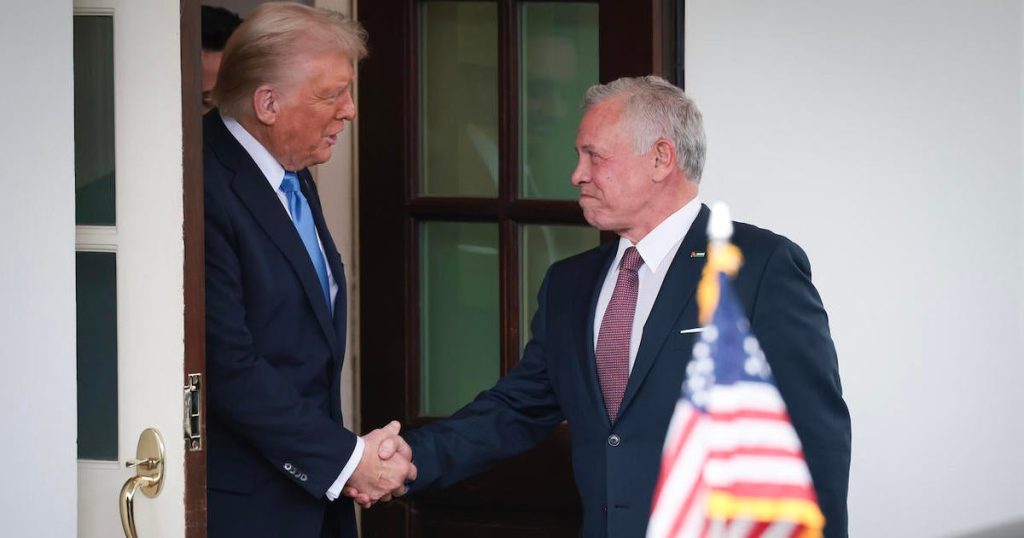Trump Meets with King of Jordan Amid Growing Tensions
On Tuesday, President Donald Trump held a significant meeting with King Abdullah II of Jordan in the Oval Office. While Jordan is geographically about 300 miles away from the Gaza Strip, the discussions centered heavily on the future of the Gaza Strip, a region embroiled in decades of conflict. The meeting comes amid escalating tensions in the Middle East, particularly surrounding the Israeli-Palestinian conflict. President Trump used the occasion to reaffirm his administration’s stance on the Gaza Strip, stating that the U.S. intends to take control of the territory. He also declared that Palestinians would not be returning to the area and suggested that the financial burden of the operation would fall on regional countries. This bold announcement has sparked widespread concern and debate, both within the region and internationally.
A Region on Edge: The Gaza Strip’s Uncertain Future
The Gaza Strip, a coastal territory bordering Israel and Egypt, has long been a focal point of conflict in the Middle East. Home to nearly two million Palestinians, the region has endured repeated wars, blockades, and humanitarian crises. The U.S. government’s assertion that it will take over the territory has raised eyebrows, as it directly challenges the long-standing international consensus on the issue. For decades, the global community has supported a two-state solution, which would establish an independent Palestinian state alongside Israel. Trump’s declaration appears to dismiss this approach, instead advocating for a U.S.-led takeover of Gaza, with regional countries footing the bill. This stance has left many questioning the implications for peace, stability, and the rights of the Palestinian people.
King Abdullah’s Role in the Region
As the leader of Jordan, a key player in Middle Eastern diplomacy, King Abdullah II has consistently positioned himself as a mediator and stabilizing force in the region. Jordan hosts a significant number of Palestinian refugees and has historically advocated for a peaceful resolution to the Israeli-Palestinian conflict. During his meeting with Trump, King Abdullah likely expressed concerns about the potential consequences of the U.S.’s proposed actions. Jordan’s proximity to Gaza, both geographically and politically, means that any major shifts in the region’s dynamics would have a direct impact on the kingdom. The king’s involvement in the discussions underscores the gravity of the situation and the need for a balanced, inclusive approach to addressing the Gaza Strip’s future.
Human Cost of Geopolitical Decisions
The announcement by President Trump has raised alarm bells among human rights organizations and advocates for the Palestinian people. Taking over the Gaza Strip and barring Palestinians from returning would likely exacerbate an already dire humanitarian situation. The region has faced severe economic hardship, limited access to basic necessities, and recurring violence. Displacing or denying the right of return for Palestinians would not only violate international law but also deepen the sense of injustice among the affected population. The emotional and psychological toll of such a decision cannot be overstated, as it would further erode hope for a peaceful and equitable resolution to the conflict.
A Call for Regional and Global Responsibility
President Trump’s suggestion that regional countries should bear the financial burden of the operation in Gaza highlights the complex web of interests and responsibilities at play. While Jordan, as a neighbor and key regional actor, may be expected to play a role, the international community as a whole cannot turn a blind eye to the crisis. The Gaza Strip’s future is not just a regional issue but a global one, requiring a collective effort to address its humanitarian, political, and economic challenges. For any solution to succeed, it must be grounded in justice, equality, and respect for human rights. Without these principles at the forefront, any intervention risks perpetuating cycles of violence and instability.
The Way Forward: Diplomacy and Dialogue
As the situation in the Gaza Strip continues to unfold, the importance of diplomacy and dialogue cannot be overstated. The meeting between Trump and King Abdullah serves as a reminder of the urgent need for leaders to come together and find a path forward that prioritizes peace and the well-being of all people in the region. The U.S., Jordan, and other international actors must work collaboratively to address the root causes of the conflict and ensure that any solution respects the rights and dignity of Palestinians and Israelis alike. The road ahead will be challenging, but with commitment, compassion, and a willingness to engage in meaningful dialogue, a brighter future for the Gaza Strip and the entire region remains possible.












